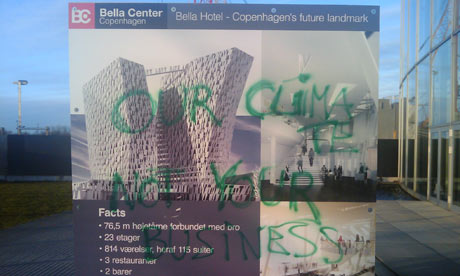
'Our climate, not your business' - a graffitied sign at the Carbon Market Insights Conference. Photograph: Bryony Worthington
osted by Bryony Worthington Thursday 19 March 2009
This week's Carbon Market Insights Conference in Copenhagen has proved emissions trading is not as dull as it sounds. Just look at the debate of the dramatic price falls in the price of carbon, or the ideological splits emerging between the EU and UN's climate negotiators.
It has struck me there are two conferences going on here. There are the traders, brokers and permit sellers for whom this is a trade conference. They are here to win new business. They sponsor high tech stalls, hand out freebies, provide free cocktails and beer and hire fancy nightclubs to throw parties.
But there are also NGO's, think tanks, policy people and government representatives here. They are here to discuss where emissions trading policy might be going in the future.
The contrast between the two groups is quite stark. Men in stripy suits are really completely indifferent to whether this market is really doing anything for the environment. They can make money whatever the market conditions – they just need volatility and fortunately for them this market delivers that quite effectively.
The other group do care about whether this market is delivering, they have studied it in detail and have many ideas for how it can be improved. This is the group I was hoping to find here. They will be faithfully following every bend in the road to this December's Copenhagen climate treaty negotations, doing what they can to improve the chances of a sensible deal being reached. The conversations in the corridors are wide ranging and full of solutions: how to expand the market to include transport emissions, how to increase the targets to be better in line with the science.
A third group of people also made their presence known during the conference. They were a small but noisy group of 20 or 30 student protesters who banged drums and windows, stayed for about an hour, and then left. The only sign of their presence was the graffiti left behind: "Our climate, not your business" (see above).
I am sympathetic to their concerns. This industry has effectively privatised pollution and so far failed to demonstrate it can deliver the scale of change necessary to tackle the problem. But, I am also a pragmatist.
To increase the chances of carbon trading's success the NGOs and media need to act as a conduit for public pressure – distilling some of the complexities into clear messages and helping people to make their voices heard.
I fear this isn't happening, but the combined effect of lots of disparate voices may still succeed in creating political pressure to allow the ideas of the policy experts to flourish. I hope so. It would be nice if some of the men in stripy suits also joined the debate, but perhaps that is expecting too much.
• Bryony Worthington is founder of Sandbag, a not-for-profit organisation seeking to engage civil society in improving emissions trading policy. Sandbag is part of the Guardian's Environment Network.

No comments:
Post a Comment